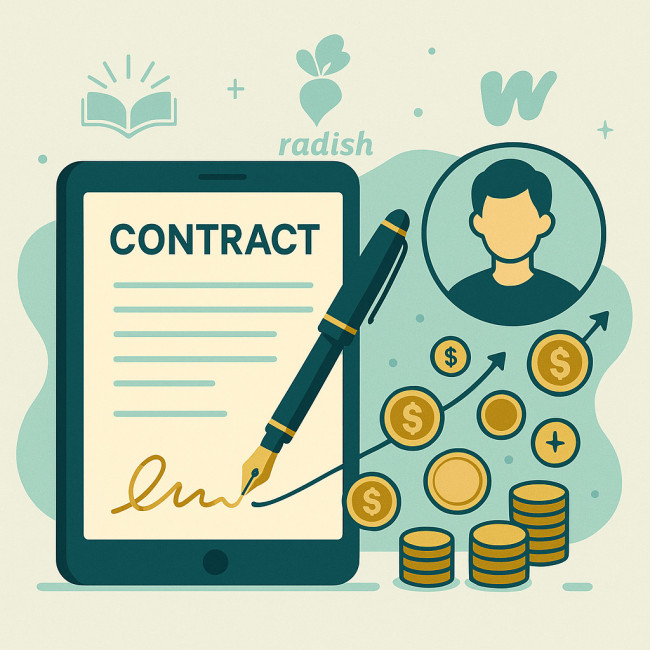Royalty-share contracts on serialized platforms: what to know before uploading
Uploading a serial to Kindle Vella, Radish or Wattpad seems friction-free—until you meet the royalty-share contract. This guide walks you through the clauses that decide how much you earn, how long you stay locked in, and how to spot deal-breakers before you click “Publish”.
Royalty-share contracts, in plain English

Unlike a classic flat-fee license, a royalty-share deal promises ongoing income tied to sales or token purchases. The platform collects reader payments, deducts its commission and taxes, then pays you a percentage of what remains. On the surface, the math reads like a friendly partnership, yet every decimal hides a negotiation over definitions—tax withholding, foreign-exchange spreads, promotional discounts and refund claw-backs all chip away at the pool from which your share is calculated. Understanding each offset now prevents bitter surprises during your first royalty statement.
How do royalty-shares differ from flat fees?
| Aspect | Royalty-Share | Flat Fee |
|---|---|---|
| Up-front payment | None or small advance | 100 % confirmed on signing |
| Long-term upside | Unlimited, scales with readership | Zero after fee recouped |
| Rights control | Often exclusive for X years | Usually non-exclusive |
| Risk profile | Author shoulders audience risk | Platform or client shoulders risk |
Clauses you must read twice
1. Revenue-split formula
Look for the net versus gross definition. A 50 % royalty on net after platform fees may equal only 25 % of what readers actually paid. Ask for a worked example in writing.
2. Recoupment & advance
If you receive a small advance, verify how quickly the platform claws it back. Some deduct 100 % of your early royalties until the advance is repaid, delaying your first payout by months.
3. Term length & reversion
Many serialized portals auto-renew in one-year increments. Insert a reversion clause that returns rights if revenue drops below a threshold for two consecutive quarters.
4. Territory & language
An English-only upload can still bar you from selling translation rights elsewhere. Negotiate to retain foreign-language licensing latitude.
5. Derivative works
Streaming adaptations, audio dramas, comics—serial platforms love optioning them in advance. Cap their option window to 18 months and keep compensation on par with market rates.
Platform royalty benchmarks in 2024
Legal pitfalls unique to serial fiction
- Rolling uploads as acceptance – Many contracts deem each new episode an automatic acceptance of any future Terms of Service changes.
- Platform exclusivity bleed-over – Some clauses forbid any content “substantially similar,” blocking spin-off newsletters or Patreon extras.
- Advertising inserts – When ads appear between episodes, confirm whether ad revenue joins the royalty pot or belongs 100 % to the platform.
Negotiation tactics for indie authors

Royalties are seldom carved in stone, even on template-driven portals that claim the terms are “non-negotiable.” Behind every upload button sits a real business team measured on author retention. If you present a data-backed argument and demonstrate how your serial can drive sustained reader acquisition, the door to a better cut swings open farther than you might expect. Here are a few practical levers you can pull:
- Bundle leverage—Offer an early-access window or social-media cross-promotion in exchange for a higher author share.
- Quote industry data—Benchmarks from author day-rate studies add weight to your counter-offer.
- Ask for a step-up—Negotiate a tiered share: 45 % up to \$5k gross, 55 % above.
When professional counsel is priceless
If your serial garners six-figure reads or attracts a studio query, bring in an IP lawyer. The cost is modest compared with losing adaptation rights forever. For multi-author projects, brush up on co-writing contract fundamentals to align everyone's expectations.
Track, audit, repeat
Choose a dashboard that imports CSV royalty reports and flags anomalies. Platforms rarely volunteer granular data, so independent tracking is vital. Many creators swap tracking templates inside the Artfolio author collaboration hub, fostering peer audits and collective leverage.
Quick knowledge check
FAQ
- Can I publish the same episodes on my personal blog?
- Only if the contract is non-exclusive. Most platforms demand exclusivity for a set term; dual posting may trigger takedown or revenue forfeiture.
- Do I need an LLC to sign a royalty-share deal?
- No, but separating income through a legal entity can simplify taxes and liability once your readership—and revenue—grows.
- What happens to my royalties if the platform shuts down?
- Look for a survival clause. Ideally, unpaid royalties remain due and rights revert automatically so you can republish elsewhere.
- Are bonus tokens or promotional credits counted in my royalty?
- Often they are excluded. Clarify whether promotional activity is treated as a sale (with lower price) or as a zero-value marketing tool.
- Is a lawyer necessary for small projects?
- If your exposure is low—under \$1 000 projected revenue—you can rely on self-help resources like digital-first look deal guides. For anything bigger, budget at least a contract review.
Secure your royalties today
You worked hard on every cliff-hanger. Give your episodes the legal foundation they deserve. Download our free checklist and step into your next negotiation with confidence.











